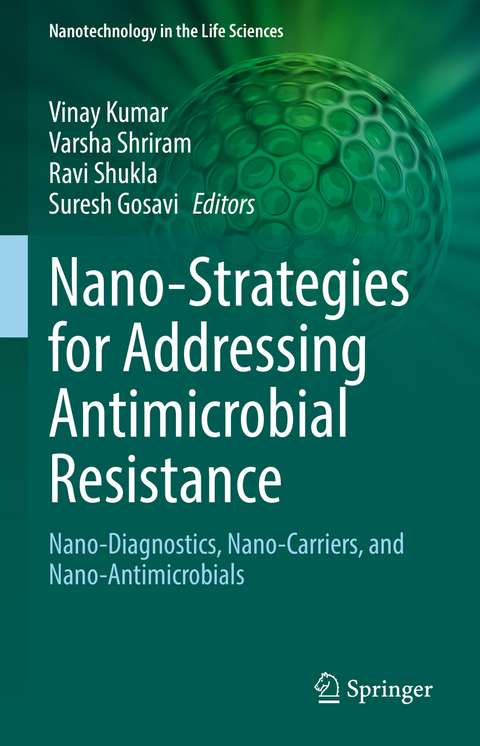
Nano-Strategies for Addressing Antimicrobial Resistance
Springer International Publishing (Verlag)
978-3-031-10219-6 (ISBN)
Dr. Vinay Kumar is working as an Associate Professor in Biotechnology Department, Modern College (Savitribai Phule Pune University), Ganeshkhind, Pune, India. He did his Ph.D. in Biotechnology from Savitribai Phule Pune University in 2009. He has published 70+ peer reviewed research/review articles with over 3400 citations, 27 book chapters besides editing 6 books. He is a recipient of Young Scientist Award from SERB, Government of India. His research interests include antimicrobial resistance (AMR) in community settings, elucidating mechanisms underlying AMR and combating it with phytochemicals and nanomaterials. He is on editorial and reviewer boards of reputed journals. Dr. Varsha Shriram has completed her PhD in natural products chemistry and biotechnology from CSIR-National Chemical Laboratory, Pune and Savitribai Phule Pune University, Pune, India. She is currently working as an Associate Professor, Botany Department, Prof. Ramkrishna More College, Akurdi (Savitribai Phule Pune University), Pune, India. She has published more than 35 peer-reviewed research/review articles, with over 2200 citations and is on reviewer board for reputed journals. Her areas of research interest include medicinal plants, phytochemicals, bioactivities including anticancer and antimicrobial resistance reversal. She has completed extramural research projects in these and allied areas. Dr. Ravi Shukla is currently an Associate Professor of Bioscience & Food Technology, and Co-leader of Sir Ian Potter Biosensing Facility, at the RMIT University Australia and routinely engages and contribute to day-to-day University academics. He has over 20 years of research experience in the interdisciplinary research areas spanning Biosciences, Food and Materials Science; and supervised 15 Ph.D., 5 Masters, and over 50 undergraduate researchers through to completion. His peers regard him as a meticulous cell & molecular biologist and cross-disciplinary researcher working towards understanding of cellular responses to materials. He is a co-Editor-in-chief of Current Research in Nutrition & Food Science and serves on editorial board of several journals including special sections of Nanobiotechnology in Frontiers open access journals. He has authored 100+ research publications with over 7000 citations and a Hirsch index of 37; and contributed to over 20 patents and invention disclosures for his inventions. Dr. Suresh Gosavi is currently working as a Senior Professor of Physics, Director of School of Physical Sciences, Head of Environmental Science Department, and Director School of Basic Medical Science, at Savitribai Phule Pune University, Pune, India. He has also worked as visiting professor at University of Franche Comté, Basancon, France; King Saud University, Saudi Arabia, University of Melbourne, Australia and presently working at PIRC, Tokyo University of Science, Tokyo, Japan. He has more than 30 years of teaching and research experience. His research interests mainly include nanomaterials and nanotechnology / nano-bio systems and applications, besides nano-capsules and targeted DNA vaccines for immunotherapy of cancer; Micro and nanofludics; Solar thermal technology for rural electrification. He has supervised 26 doctoral and 16 MPhil students, besides mentoring 14 post-doctoral fellows. He is a Fellow of Maharashtra Academy of Science. Dr. Gosavi is on editorial and reviewer boards of several journals of repute. He has published 227 journal articles so far and has 8 patents to his credit.
1.The History of Antibiotics Illumes the Future of Antimicrobial Peptides Administered Through Nano-Systems.- 2.Current approaches and prospects of nanomaterials in rapid diagnosis of antimicrobial resistance.- 3.Nanomaterials-mediated delivery of antimicrobial agents 'The Nanocarriers'.- 4.Nanoparticle functionalization: Approaches and applications.- 5.Nano-adjuvants as effective next-generation antimicrobial agents.- 6.Limiting antibiotic-resistant bacteria using multifunctional nanomaterials.- 7.Microbial resistance mechanisms and potential of metal-organic framework in mitigation thereof.- 8.Silver-based Nano-Formulations for Treating Antibiotic-Resistant Microbial Strains.- 9.Gold Nanoparticles: A Lethal Nanoweapon against Multidrug Resistant Bacteria.- 10.Antimicrobial Potentials of Zinc and Iron Oxide Nanoparticles.- 11.Carbon Nanostructures for Fighting Antimicrobial Resistant Bacteria.- 12.Nano-formulations against Multidrug Resistant Members of ESKAPE pathogens.
| Erscheinungsdatum | 20.12.2022 |
|---|---|
| Reihe/Serie | Nanotechnology in the Life Sciences |
| Zusatzinfo | X, 415 p. 57 illus., 54 illus. in color. |
| Verlagsort | Cham |
| Sprache | englisch |
| Maße | 155 x 235 mm |
| Gewicht | 759 g |
| Themenwelt | Naturwissenschaften ► Biologie ► Botanik |
| Naturwissenschaften ► Biologie ► Genetik / Molekularbiologie | |
| Technik ► Umwelttechnik / Biotechnologie | |
| Schlagworte | alternative therapies • Antimicrobial Resistance • Nanodiagnostics • nanomaterials • Nanotherapeutics |
| ISBN-10 | 3-031-10219-3 / 3031102193 |
| ISBN-13 | 978-3-031-10219-6 / 9783031102196 |
| Zustand | Neuware |
| Informationen gemäß Produktsicherheitsverordnung (GPSR) | |
| Haben Sie eine Frage zum Produkt? |
aus dem Bereich


